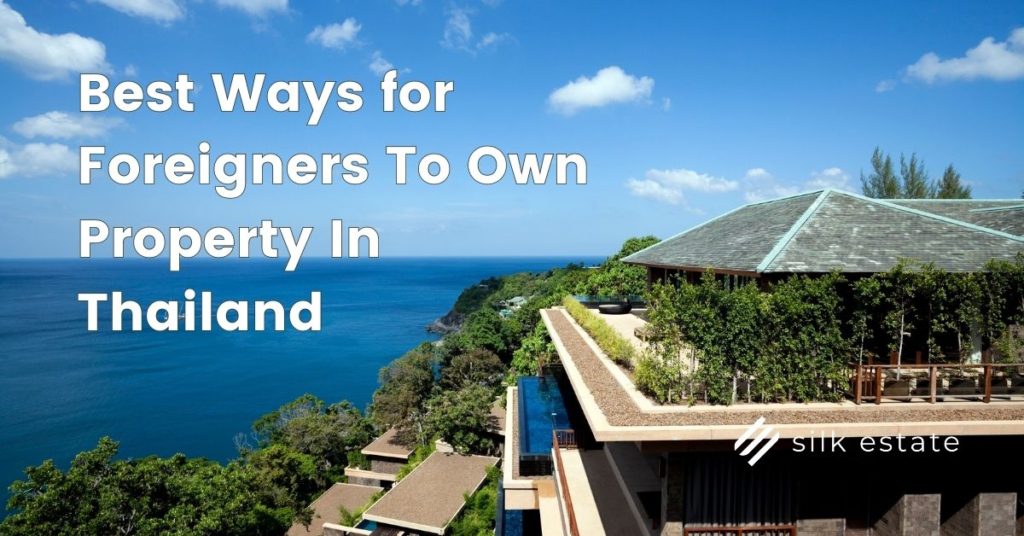In this comprehensive guide, we will explore the different ways foreigners can legally own property in Thailand, providing you with invaluable insights and knowledge to make informed decisions.
From freehold ownership of condominiums to leasehold arrangements, joint declarations, and exceptions to ownership restrictions, we’ll explore each option in detail.
We’ll discuss recent developments and legal considerations to keep you up-to-date on the ever-evolving landscape of property ownership in Thailand and by the end of this article, you’ll be equipped with the knowledge you need to navigate the intricacies of property ownership in Thailand and make informed decisions that align with your aspirations.
Table of Contents
Are Foreigners allowed to own land in Thailand?
Thai law usually doesn’t let foreigners buy land directly. There might be exceptions, but they almost never happen in reality. However, foreigners can still acquire property in Thailand through options like setting up a Thai Limited Company or entering into a long-term lease with the landowner.
Even though foreigners can’t usually buy land directly in Thailand, there are other ways to do it. One common way is to create a Thai Limited Company to own the land for you. Another way is to have a long-term lease with the person who owns the land. Plus, foreigners can own the buildings on the land. You just need to get a building permit in your name.
It’s important to learn about how to buy property in Thailand. Understanding Thai title deeds will help you know what rights you have over the land. It’s also good to know the costs of transferring property and the taxes in Thailand before you buy. A property transfer calculator can help figure out the total cost.
To make sure everything goes well, it’s a good idea to use a legal service. Find a lawyer in Thailand who specializes in property and has a good reputation. This way, you’ll be protected and your dream of owning property in Thailand can come true. You can find them here.
Understanding Freehold Ownership of Condominiums
Freehold ownership of condominiums is the most popular choice for foreigners looking to invest in property in Thailand. Under Thai law, up to 49% of the unit area of any condominium may be owned by foreigners.
This means that if the condo units adhere to the legal percentage, foreigners can own and hold the purchased condo permanently until they decide to sell it. Additionally, owning a freehold condominium grants a fractional interest in the common areas, allowing ownership of a small portion of facilities like car parks, gardens, swimming pools, and reception areas. The fractional ownership interest also translates into a share of the vote in the homeowner’s association.
Exploring Condotels or Hotel-Licensed Condominiums
Condotels, also known as hotel-licensed condominiums, offer a unique investment opportunity that combines the benefits of condominium ownership with the convenience of a hotel. While foreigners can legally own condotel units in Thailand, there are certain considerations to keep in mind. Typically, owners can stay in the condotel for a limited period, usually up to two weeks to a month per year.
The remaining time, the condotel is rented out by the hotel as part of their establishment. Condotels may also provide options for participation in rental pool systems, where owners combine their rental income and receive a share according to the rules and regulations of the pool. Exploring condotels offers a way to benefit from rental income potential and the convenience of hotel services.
Branded Residences
Branded residences are a unique segment of the real estate market in Thailand. These properties are developed and managed by renowned hotel or hospitality brands, providing a blend of luxurious living and exceptional services.
Branded residences offer the opportunity to own a property that combines residential ownership with the prestige and amenities associated with the brand. These properties are typically found in prime locations and provide access to exclusive facilities, such as pools, fitness centers, spa services, and concierge assistance.
Exploring branded residences in Thailand allows foreigners to experience a high-end lifestyle with top-notch services and management assurance.
Understanding Leasehold Agreements and Considerations
While foreigners are not legally allowed to own land in Thailand, leasehold ownership offers an alternative for those interested in owning landed properties such as houses, townhouses, and individual villas. Leasehold agreements allow foreigners to lease the land on which the freehold property is built, providing the peace of mind and satisfaction of staying in Thailand while adhering to legal requirements.
Leasehold agreements typically have a maximum duration of 30 years. As a lessee, you are granted the right of exclusive possession, allowing you to use the property as a home or a rental property throughout the lease period. Every lease must be registered at the local Land Office, providing legal security for the foreign lessee.
Many developers include clauses in sale and purchase agreements, promising lease renewals for additional 30-year terms, effectively extending the lease term up to 90 years (30+30+30). It’s important to work with reputable developers and experienced lawyers to ensure successful lease renewals.
Exploring Secured Leases or Protected Leases
Secured leases, also known as protected leases or collective leases, present another option for foreigners interested in long-term property ownership in Thailand. Under this structure, the tenant enters into a lease agreement while simultaneously signing a sale and purchase agreement with the Thai company of the developer.
In most cases, the developer is involved in developing a collection of villas leased to foreign individuals. Foreign lessees collectively own shares of the offshore company, which has a minority shareholding in the lessor company. This ownership comes with special rights, including voting power, allowing the offshore company to influence the direction and actions of the Thai company.
By ensuring proper structuring and adherence to Thai shareholding regulations, secured leases offer the assurance of lease renewals. Foreign lessees have the power to make renewal decisions collectively, and heirs can enforce succession clauses for long-term investment security.
It’s essential to note that secured leases have faced legal challenges in Thailand. Therefore, it is crucial to work with developers who have properly structured the leases to protect your investment in the long term.
Purchasing Through a Thai Company

When it comes to property ownership in Thailand, purchasing through a Thai company is a popular option for foreigners. Setting up a Thai company allows for ownership of properties registered under the company’s name. It’s important to note that proper legal advice and guidance are crucial to ensure compliance with Thai laws and regulations.
One option often chosen by foreign buyers is to establish an offshore investment firm, with the British Virgin Islands being a favored choice due to its low operational costs, competitive property pricing, and reliable administration. Through offshore company shares, ownership can be easily transferred to new buyers when desired, providing flexibility and ease of investment.
Working with legal and financial professionals experienced in Thai property laws is essential to properly structure the Thai company and ensure compliance with all legal requirements. They will guide you through the process, ensuring that the company is a legitimate business and that Thai shareholders are involved to meet the legal ownership restrictions.
Exceptions to Foreign Ownership:
While there are restrictions on foreign ownership of landed property in Thailand, there are a few exceptions that allow foreigners to have freehold ownership.
Prescribed Investment:
Thailand’s Land Code Act provides an avenue for foreign freehold land ownership through a prescribed investment. This involves investing in bonds of State Enterprises, the Bank of Thailand, the Thai Government, or bonds secured by the Ministry of Finance. By making a prescribed investment, foreigners can allocate a portion of their funds towards qualifying bonds and utilize the remaining balance to purchase a villa or property.
The Board of Investment (BOI):
Foreigners who wish to promote a business or invest in Thailand can benefit from specific privileges granted by the Board of Investment (BOI). These privileges may include permission to own land. Under the BOI scheme, foreigners can control their Thai business, enabling them to have legal control over any land owned by the company.
Buying Villas Through a Thai Company:
Although foreigners are generally restricted from owning landed property, a common approach is to set up a Thai Limited Company. The company must be run as a legitimate business, generating revenue and having proper Thai shareholders. Foreigners can own up to 49% of the company shares, with Thai nationals owning the remaining 51%. It’s crucial to seek proper legal advice to ensure compliance with Thai laws and regulations.
Purchasing Luxury Properties in Thailand:
For those seeking the epitome of elegance and sophistication, Thailand offers a range of luxury properties that cater to discerning buyers. Whether you desire a high-end condo or an upscale villa, Thailand’s real estate market provides options to fulfill your desires for a luxurious lifestyle.
High-End Condos:
Thailand’s major cities, such as Bangkok and Phuket, boast a selection of high-end condominium developments that cater to luxury living. These condos feature lavish amenities, breathtaking views, and impeccable design.
With world-class facilities like infinity pools, private gyms, spa services, and concierge assistance, high-end condos provide the ultimate comfort and convenience. They often showcase modern architectural design and cutting-edge technology, ensuring a luxurious and sophisticated living experience.
Upscale Villas and Exclusive Properties:
Thailand is renowned for its exclusive and picturesque villas, offering unparalleled privacy and opulence. These upscale properties are located in prime locations, such as beachfront estates, hillside retreats, or lush tropical enclaves. Upscale villas feature expansive living spaces, private pools, lush gardens, and panoramic views.
These properties are designed with meticulous attention to detail and provide a tranquil sanctuary for indulgence and relaxation. They often incorporate luxurious features like private spa rooms, home theaters, wine cellars, and extensive outdoor entertaining areas, creating a true oasis of luxury.
Joint Ownership of Landed Properties
For foreigners interested in owning landed properties in Thailand, joint declarations provide a legal framework for shared ownership. Joint ownership allows multiple individuals to collectively own a property, sharing the rights and responsibilities associated with it.
Joint Ownership of Landed Properties:
If you are married to a Thai citizen, joint ownership of land is restricted in Thailand. However, there is an option for your Thai spouse to purchase the property in their name with a legally binding joint declaration. This declaration states that the funds used for the purchase are solely contributed by your Thai spouse.
It’s important to note that in this arrangement, your Thai spouse retains the right to legally rent out, lease, or sell the property without your consent. To ensure your uninterrupted stay on the property, one option is to enter into a lease agreement with your spouse, where you lease the land from your spouse for a term of 30 years. This lease agreement grants you the right to reside in the house without any legal issues for the duration of the lease.
However, it’s crucial to carefully review the lease agreement as some agreements may allow for early termination, potentially voiding the lease within 12 months from the start date. Seeking legal advice and ensuring clear terms and conditions in the lease agreement can help protect your interests and provide peace of mind.
Legal Considerations for Purchasing Through Thai Friends or Nominees
If you have trustworthy Thai friends who are willing to assist you in purchasing a property in Thailand, it can be an option to explore. However, there are important legal considerations to keep in mind when purchasing through Thai friends or nominees.
When utilizing a Thai friend to purchase a property on your behalf, it’s essential to be aware of certain legal implications. While the money for the property investment must be provided by a Thai citizen, it’s important to note that as a foreigner, you cannot legally hold the deed to the land. This means that the property will be registered under your Thai friend’s name.
It’s crucial to understand that, in this arrangement, your Thai friend has the legal right to sell, lease, or dispose of the property without your consent. This is an important consideration, as you do not have direct control over the property’s fate.
To ensure your secure use and enjoyment of the property, one option is to enter into a lease agreement with your Thai friend. By leasing the building from your friend, you can legally secure the right to use the property for a specified period, typically up to 30 years, depending on the lease terms.
However, it’s important to note that purchasing through Thai friends or nominees comes with potential risks. There is a possibility that authorities may discover the arrangement and deem your friend as an illegal nominee acting on your behalf, which can have legal consequences.
When considering this option, it’s advisable to seek legal advice to ensure compliance with Thai laws and regulations. Consulting with experienced professionals will help you navigate the legal complexities, protect your interests, and make informed decisions regarding property purchases through Thai friends.
Here is a quick overview of the 9 different ways to own property in Thailand.
Freehold Ownership:
- Freehold Condominiums: Foreigners can own up to 49% of the unit area in a condominium development.
Leasehold Ownership:
- Leasehold Arrangements: Foreigners can lease land or property for a specified period, usually up to 30 years.
Joint Declarations:
- Joint Ownership with Thai Spouse: If married to a Thai citizen, a foreigner can co-own land through a joint declaration stating that the Thai spouse’s funds were used for the purchase.
Purchasing Through a Thai Company:
- Thai Company Ownership: Foreigners can set up a Thai company and own property through the company, with Thai shareholders owning at least 51% of the shares.
Secured Leases:
- Secured Lease Agreements: Foreigners can sign lease agreements while simultaneously entering into sale and purchase contracts with Thai companies, giving them ownership rights and lease renewals.
Buying Through Offshore Companies:
- Purchasing Through Offshore Companies: Foreigners can buy a property through offshore companies, simplifying inheritance planning and ownership transfers.
Prescribed Investment:
- Making a Prescribed Investment: Foreigners can invest in bonds approved by Thailand’s Land Code Act, using the investment balance to purchase the property.
Board of Investment (BOI) Promotion:
- BOI Scheme: Foreigners investing in or promoting businesses in Thailand may be granted land ownership privileges through the BOI scheme.
Buying Villas Through Thai Friends or Nominees:
- Purchasing through Thai Friends or Nominees: Foreigners can have Thai friends or nominees purchase property on their behalf, although caution should be exercised.

Recent Developments in Foreign Ownership of Property in Thailand
Thailand has recently made significant progress in facilitating foreign ownership of property, particularly with the approval of a draft ministerial regulation in October 2022. If implemented, this regulation would allow foreigners to directly purchase land in Thailand as individuals, providing them with greater control and ownership rights.
The proposed changes aim to attract foreign investors, including property developers from China, by offering them the opportunity to acquire up to 1 rai (1,600 square meters) of land in designated areas such as Bangkok, Pattaya city, municipal zones, or specified residential locations. Eligible investors need to meet specific criteria related to their assets, income, employment, or skills, along with holding long-term resident visas and demonstrating significant prior investments in Thailand.
These recent developments offer promising prospects for foreign investors, as they can gain direct ownership of land and tap into the potential of Thailand’s real estate market. The new regulations not only provide increased opportunities for property developers but also contribute to the country’s economic growth initiatives.
By actively monitoring policy updates and understanding the evolving landscape of foreign property ownership, investors can make informed decisions and seize the advantages presented by these recent developments.
Recent Developments in Foreign Ownership of Property in Thailand
Read more about the recent property developments in Thailand overview
Risks of Buying Property in Thailand
While there are opportunities and benefits to owning property in Thailand as a foreigner, it’s important to be aware of the potential risks involved. Here are some key risks to consider:
Legal and Regulatory Complexity
Thailand’s property laws and regulations can be complex, and navigating through them may require professional assistance. Working with experienced lawyers and real estate advisors who understand Thai property laws is crucial to ensure compliance and protect your interests.
Title and Ownership Issues
It’s essential to conduct thorough due diligence to verify the title and ownership of the property you intend to purchase. Ensuring that the seller has a clear and legal right to sell the property will help prevent future disputes or legal complications.
Leasehold Limitations
If you opt for a leasehold arrangement, be aware of the lease duration and any limitations it may have. Lease renewals and potential changes in regulations can affect the long-term security of your investment. Carefully reviewing the lease agreement and seeking professional advice can mitigate these risks.
Market Volatility
Like any real estate market, the property market in Thailand can experience fluctuations. Economic factors, changes in government policies, and market conditions can impact property values. It’s important to assess the market trends and consult with experts to make informed investment decisions.
Currency Fluctuations
Foreign buyers should be mindful of currency exchange rates, as fluctuations can affect the overall cost of purchasing and maintaining a property. It’s advisable to consider the potential impact of currency fluctuations and seek financial advice to mitigate risks.
Construction Quality and Delays
If you’re buying a property that is under construction or off-plan, there can be risks associated with the quality of construction and potential delays in completion. Conducting thorough inspections, reviewing the developer’s track record, and ensuring proper contractual agreements are in place can help mitigate these risks.
Maintenance and Management
Owning a property in Thailand requires ongoing maintenance and management. If you are not residing in Thailand permanently, it’s important to consider the costs and logistics of managing the property remotely. Engaging reputable property management services can help ensure the proper upkeep and rental management of your property.
Cultural and Language Differences
Thailand has a unique culture and legal system. Foreign buyers should be aware of cultural nuances and language barriers when dealing with local authorities, developers, and sellers. Engaging professionals who are fluent in both English and Thai can help facilitate effective communication and minimize misunderstandings.
It’s crucial to thoroughly assess these risks and conduct comprehensive due diligence before making any property purchase in Thailand. Seeking advice from legal, financial, and real estate professionals will help you navigate the potential risks and make informed decisions to safeguard your investment.
Final Thoughts About How To Own Property In Thailand:
In conclusion, Thailand offers several legal avenues for foreigners to own property, providing attractive opportunities for investment and personal use. Throughout this blog post, we have explored various options, including freehold condominium ownership, condotels, branded residences, buying through offshore companies, leased land, joint declarations, and purchasing through Thai friends or nominees. Each option comes with its own benefits, considerations, and requirements.
Freehold condominium ownership remains the most straightforward and popular choice for foreigners, offering permanent ownership and a share in common areas. Condotels provide investment potential and the flexibility of short-term rentals. Branded residences offer luxury living with resort management and high-quality services.
Offshore companies can be used for succession planning and inheritance purposes. Leased land and owning the building with leased land are alternatives for long-term property use. Joint declarations and purchasing through Thai friends or nominees require careful consideration and trust.
When deciding on the best approach, it is crucial for individuals to evaluate their specific circumstances, financial goals, and legal implications. Consulting with experienced professionals, such as real estate advisors and lawyers specializing in Thai property laws, is highly recommended to navigate the complexities and ensure compliance with regulations.
It is important to stay updated on any recent developments or changes in regulations regarding foreign property ownership in Thailand. As the government continues to implement policies to attract foreign investment, new opportunities may arise, and eligibility requirements may evolve.
Owning property in Thailand as a foreigner offers the potential for capital appreciation, rental income, and the chance to enjoy the country’s unique lifestyle and natural beauty. With proper due diligence and professional guidance, foreign investors can take advantage of the growing real estate market in Thailand and make informed decisions that align with their investment objectives and personal preferences.
Embrace the opportunities that Thailand presents and embark on your journey to property ownership in this vibrant and welcoming country.
Frequently Ask Questions About Buying Property In Thailand
Yes, foreigners are allowed to own certain types of properties in Thailand, such as condominium units, through various legal ownership options.
As of the time of writing, the Thai cabinet has approved a draft ministerial regulation that, if implemented, would allow foreigners to purchase land in Thailand as individuals, granting them direct ownership. However, the draft has not yet been officially implemented, and detailed rules are still being formulated. It is advisable to stay updated on the latest policy developments regarding foreign land ownership.
Owning a house in Thailand does not automatically grant you the right to stay in the country. Foreigners are typically required to obtain a valid visa to stay in Thailand for an extended period. Different visa options are available, such as the Non-Immigrant Visa or the Thai Elite Visa, depending on the intended duration of stay and specific circumstances.
Yes, foreigners can own villas in Thailand through various legal avenues, such as leasehold arrangements or purchasing through a Thai company.
Owning property in Thailand does not directly dictate the duration of stay for foreigners. The length of stay is determined by the type of visa obtained. Visa options include tourist visas, retirement visas, investment visas, and others, each with its own specific requirements and validity periods. It is important to comply with Thai immigration regulations and maintain a valid visa to stay in Thailand.
Yes, foreigners can buy a house in Thailand without Thai citizenship. However, there are certain legal ownership options and restrictions in place. Foreigners are generally restricted from owning land directly, but they can explore alternatives such as leasehold arrangements, purchasing through a Thai company, or other legal structures to own property in Thailand. Working with legal professionals familiar with Thai property laws is advisable to ensure compliance with regulations.
Ready to invest in a property in Bangkok?
Contact Silk Estate today to start your search for the perfect property.




